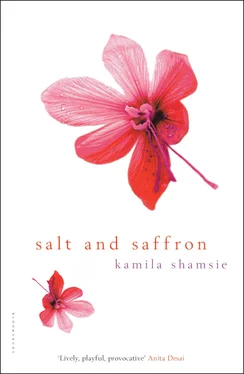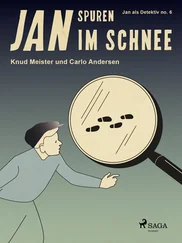‘Dadi hates the monsoons. If they come early, she leaves early.’
‘Why?’
‘I’ve never asked.’ I had my suspicions though. In avoiding the monsoons Dadi was avoiding memories of her youth in Dard-e-Dil. Dadi’s sister, Meher, had once told me that Dadi’s favourite festival of the year when they were children was the festival that marked the first of the rains. In the Dard-e-Dil palace grounds lengths of silken cord were looped around the boughs of trees and held coloured planks of wood a few feet off the ground. The young girls of the family would rush out, bangles clinking together, and would sing the monsoon songs as they swung higher and higher in the air. Beneath numerous tents great feasts were laid out, with special emphasis placed on mangoes. At the height of the mood of dizziness and gaiety the Nawab would produce a rain-shaped diamond from his pocket and bestow it on the girl who swung the highest without faltering in her singing. Dadi left Karachi before the monsoons so that she wouldn’t remember all those girls she sang with and all the lustre of her early life.
‘But I thought the monsoons were unpredictable,’ Khaleel said. ‘Don’t they sometimes start early, sometimes start not at all?’
‘Aren’t you the expert on global weather conditions? Karachi monsoons, French summers …’
‘I’m French.’
‘Shut up.’
‘No, really. My parents are professors. Physics. Both of them. And bitten by the travel bug. So they get teaching jobs all over the place. And when we were in France I got citizenship. They didn’t want me to be a US citizen because it was the seventies, Vietnam and all that, and they had visions of me growing up and being drafted to fight in some war they considered morally repugnant. Which pretty much covers all wars.’
‘But the French require you to do military service.’
‘Well, maybe I’m lying. Maybe I’m not French. Or maybe I have done military service.’
‘What’s your point?’
‘Don’t pigeon-hole me, or my family, in Liaquatabad.’
I looked down into my coffee. ‘I try very hard not to pigeon-hole Liaquatabad.’
‘So what’s the problem? Why didn’t you jump back on the Tube before the doors closed?’
‘It was my stop.’
Khaleel poured his tea into a saucer, blew on it and tipped it into his mouth. My eyes swivelled round to check that no one I knew was watching. I knew right then everything my family would need to know about Khaleel’s parents. They were hardworking, decent people. Not professors, though. Somehow they’d made it to America, land of opportunity, with barely more than the clothes on their backs, and worked absurd hours for even more absurd wages, swearing all the while that for their son it would be different. And it was. He was smart enough and lucky enough for scholarships, and he’d assimilated; maybe he’d even been offered (and accepted) the chance to live as an exchange student in England or France while still in school. At college, perhaps he’d studied abroad for a year, and now he was thinking of going back, back to Karachi, to show his parents’ families that yes, the Butts had succeeded in the US, and you wouldn’t even know how humble his parents’ origins were, except in moments when he revealed little habits he’d picked up at home, like slurping tea out of a saucer.
‘If I tell you I just drank in that manner to see your reaction you’ll never know if it’s true, or if I’m saying it precisely because I did see your reaction.’ He wiped his mouth with a napkin. ‘So for that reason, and also because I did see your reaction, let’s shake hands and say goodbye.’
‘No.’ It was time to unlearn the art of shrugging. But, even as I thought that, I knew that this time the option to step away didn’t exist. Run away, yes; but for reasons so complicated I couldn’t cope with thinking about them, and also for reasons as obvious as his smile, there could be no pretence that I was capable of ambling away with only the barest backward glance.
‘If I come to Karachi, will you visit me in Liaquatabad?’
Moments when the whole world holds its breath. ‘There was a boy I knew at college. No one important. But the last time we attempted to have a conversation he said, “The insurmountable problem is that when you think of me there’s logic to your thoughts.” ’
‘So what are you thinking now?’
‘Every night, Mariam Apa — Did I mention her on the plane? My father’s cousin? — she used to stand in our dining room just after we’d finished dinner, while Masood was clearing away the plates. She’d look out of the glass doors that led into the garden, straight at a hibiscus bush with one branch that curved out from the rest of the plant. With her index finger she’d trace in the air the length, the curve of that branch. And she never let the mali go near the hibiscus. Tended it herself. Cut, watered and manured it. And traced it every night. I don’t understand that. I would really like to understand that.’
‘Who’s Masood.’
‘Our cook. He’s the only person I’ve ever known her to speak to.’
‘All right. Time out.’ He waved his napkin in the air. ‘That’s it. There’s no way you’re not making this up.’
‘And the only food she ever ate was the food he cooked. You still want to shake hands and walk away?’
‘What is this? Are you doing some Sheherazade thing on me?’
‘No. I can’t live in anticipation for one thousand and one nights.’
‘What exactly are you anticipating?’
He could be swallowed up by the earth right now and I would never forget the touch of his finger against my elbow. Absurd, absurd thought. Memory does not preserve. How horrifying that morning when you wake up and your first thought is not of the person who has left. That’s when you know, I will never die of a broken heart.
I moved my elbow. Closer. ‘What now, Khaleel? What do we do now?’
‘Why can’t we roll with it; see where time and tide take us?’
‘Because Liaquatabad.’ I couldn’t believe I’d said it out loud. But instead of looking offended he smiled at me, as though grateful for the truth.
He paid the bill, and we started walking. ‘A history lesson,’ he said. ‘After the Mutiny of 1857—’
‘Revolt.’
‘Sorry?’
‘Not a mutiny. A revolt. Mutiny implies it was confined to a section of the armed forces, and though it’s true that it started with the Bengal Sepoys—’
‘Whatever. The point is, after it was crushed the Mughal Emperor was stripped of all his rights, his privileges. He died poor; his children lived poorer. They were born princes; they died beggars on the streets of Delhi.’ He stopped at a grocer’s to buy a bag of apples. Took one out and started munching it.
There was a photograph in an old history book of mine, showing the last Mughal Emperor, Bahadur Shah Zafar, after the Revolt. He lay on a charpoy in a dusty courtyard, no robes of state, no jewels, not even an attendant. His head was turned in the direction of the camera, but that seemed merely accidental. I have never seen anything as pathetic as those eyes. I wanted to look at that picture and say that even in these conditions he looked like a king. But he didn’t. He looked bewildered, and so sad.
‘So there could be descendants of those princes living in Liaquatabad. Have you thought of that? Maybe I’m one of them. Would it make you happier if I told you I was a Mughal prince?’
I shook my head. ‘You don’t understand. You think this is some simple complication of me believing that lineage is all. On the plane, when I talked about the not-quite-twins, I didn’t mention the first pair. You want to hear about them?’
‘I want to hear. Anything. Just keep talking.’
Читать дальше












